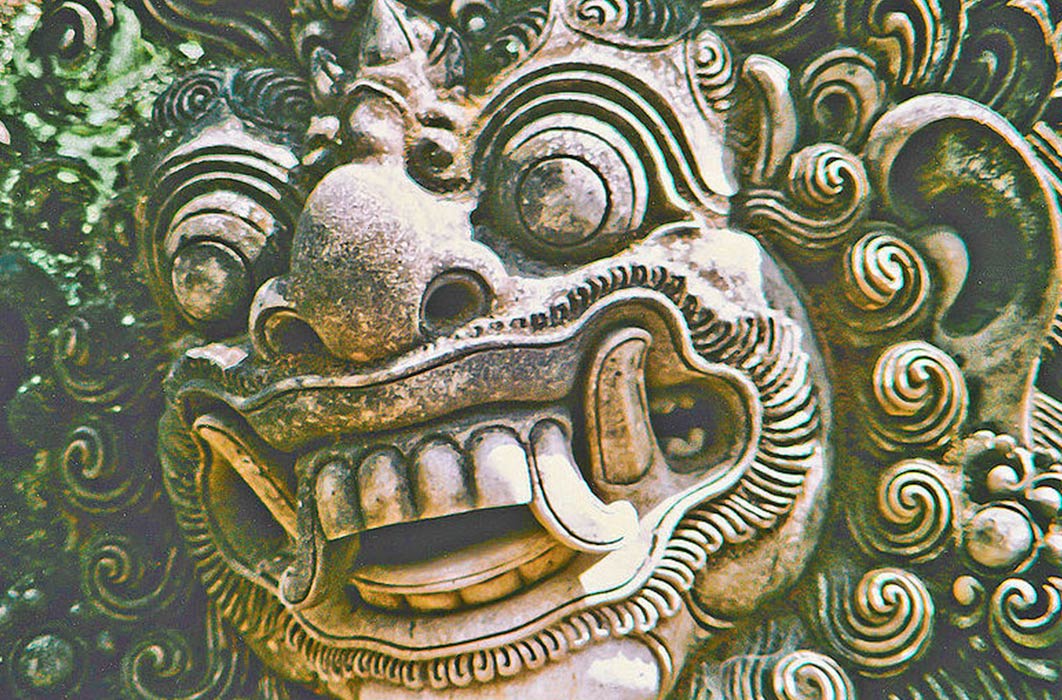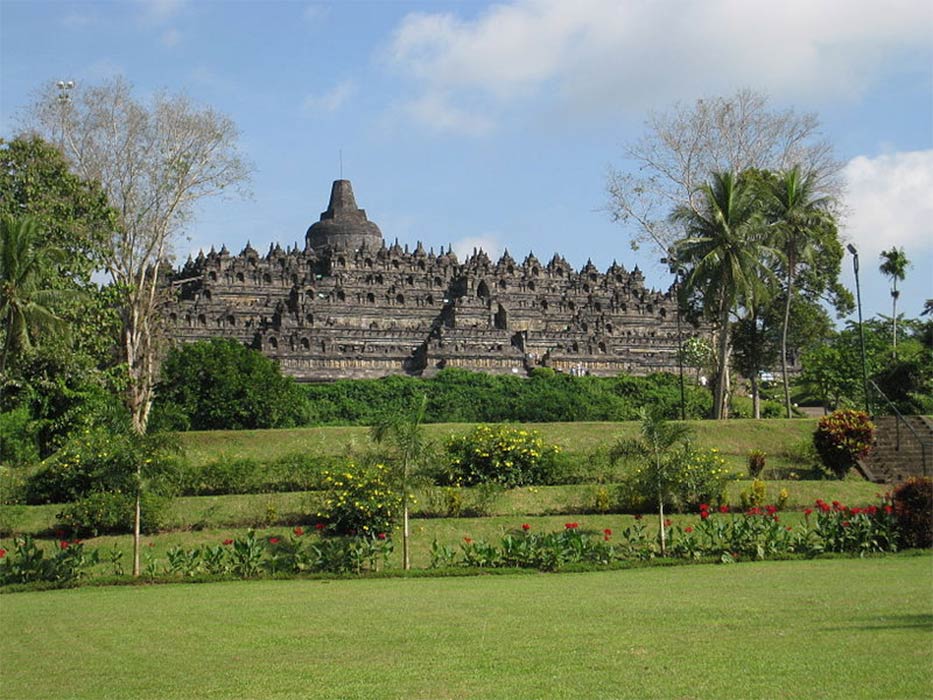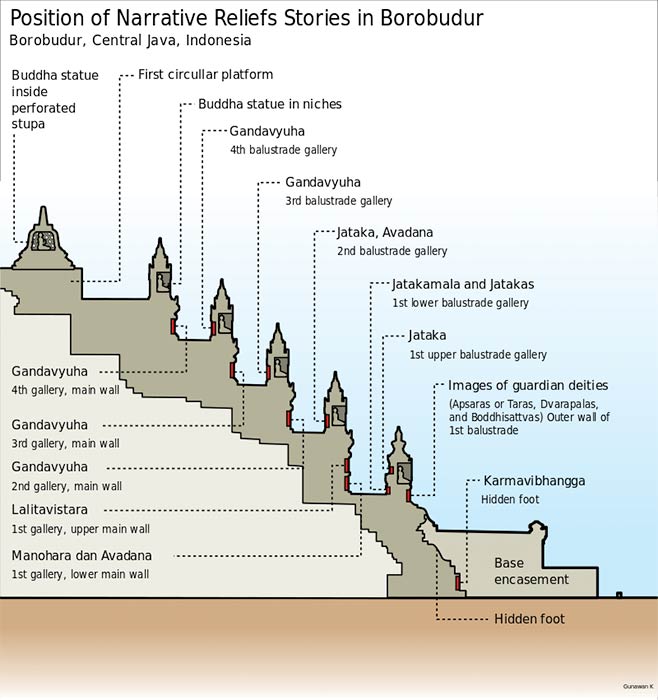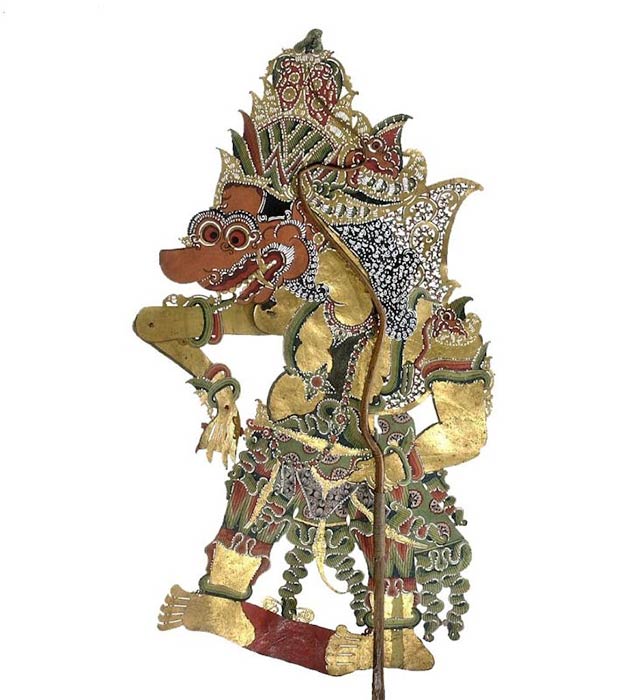
Batara Kala, the Hungry Giant God of Time and Destruction
The Borobudur Temple, the massive Mahayana Buddhist temple in Central Java, Indonesia, was built in the ninth century during the reign of the Shailendra Dynasty, which emerged in eighth-century Java. The temple’s design combines the Buddhist concept of attaining Nirvana, the release from karma and the cycle of death and rebirth, with traces of the Gupta art reflecting the influence of ancient India on the region. Apart from being a shrine to the Lord Buddha, Borobudur is also a temple for Buddhist pilgrimage. A pilgrim’s journey begins at the base of the monument and follows a path around the temple. The pilgrim then ascends to the top of the monument through the three realms in the Buddhist cosmology. Those three realms are Kamadhatu (“the world of desire”), Rupadhatu (“the world of forms”) and Arupadhatu (“the world of formlessness”). However, to experience this journey, the pilgrim will first walk through the gate of the temple adorned with a terrifying head which gives the illusion of the gate looking like the open mouth of the giant. The giant head represents Kala (“time”).

View of Borobudur, Indonesia. (Anandajoti /CC BY-SA 3.0)
Kala Messenger Of Yama
In ancient Indian epics, Kala appears as a god. In the ancient Indian epic Mahabharata, Krishna reveals his identity to the hero Arjuna as the giant, terrifying personification of Kala who would destroy everyone when their time comes. In the Uttara Kanda, the last chapter of the epic Ramayana, Kala appears as the messenger of Yama, the god of death. He told Rama that the time has come for his return to heaven. Rama accepted his advice and along with his brothers, as well as several rakshasas (giants) and monkeys, he went to the river Sarayu. It was from this river that Rama made his journey to the heavens. In the Bhagavata Purana, a holy text in Vaishnavism (a Hindu tradition that reveres the god Vishnu), Kala appears as the force that is responsible for the eventual shift in one’s life as a whole, that is creation and extinction. This impermanence is attributed to the march of time, or Kala.

The narrative bas-reliefs stories position on Borobudur wall. All of these stories derived from Buddhist sacred texts such as Lalitavistara, Manohara, Avadana, Jatakamala, Jataka, Gandavyuha, including Karmavibhangga carved along hidden foot covered by additional base encasement. (Gunawan Kartapranata /CC BY-SA 3.0)
The name Kala as a representation of the god of death already exists in Old Javanese manuscripts which are called Sastra Parwa, probably written around the ninth - 14th century AD, which consists of fragments from the Mahabharata epic. A section of the manuscript named the Bhismaparwa, which is an excerpt from the war between the Pandavas and the Kauravas in Bharatayuda, tells the story of the death of the hero Bhisma by Arjuna's arrow. Although the story is devoted to Bhisma’s heroism, Kala made an appearance when Krishna, Arjuna’s charioteer, taught Arjuna about the dharma (duty) of a Khsatriya (knight) who at times has to take a life in the name of dharma. When Arjuna asked for a proof of this, Krishna who is the incarnation of Lord Vishnu then turns himself into Kala, a giant who is ready to pounce and tear humans indiscriminately as it is his duty as the personification of time. After seeing Kala and understanding the inevitability of this war, Arjuna resolved to go to war against his kinsmen.

A Wayang puppet of Batara Kala. Tropenmuseum (CC BY-SA 3.0)
Batara Kala Eating The Sun And Men
In traditional Javanese and Balinese mythology, Batara Kala is the god of time and destruction. He rules over the Underworld along with the Underworld goddess Setesuyara. Pre-Islamic Javanese beliefs, such as those relating to the eclipse, are related to Batara Kala. For example, the solar eclipse is due to Batara Kala swallowing the sun. Therefore, people are prohibited from conducting certain activities during an eclipse such as building a house, hosting a wedding party and looking directly at the sun. When an eclipse happens, Javanese villagers would traditionally try to ‘rescue’ the sun or moon by offering sacrifices and banging lesung (traditional rice hulling equipment) or slit drums to cause noise, surprise Batara Kala and make him vomit so that he would release the sun or moon.




